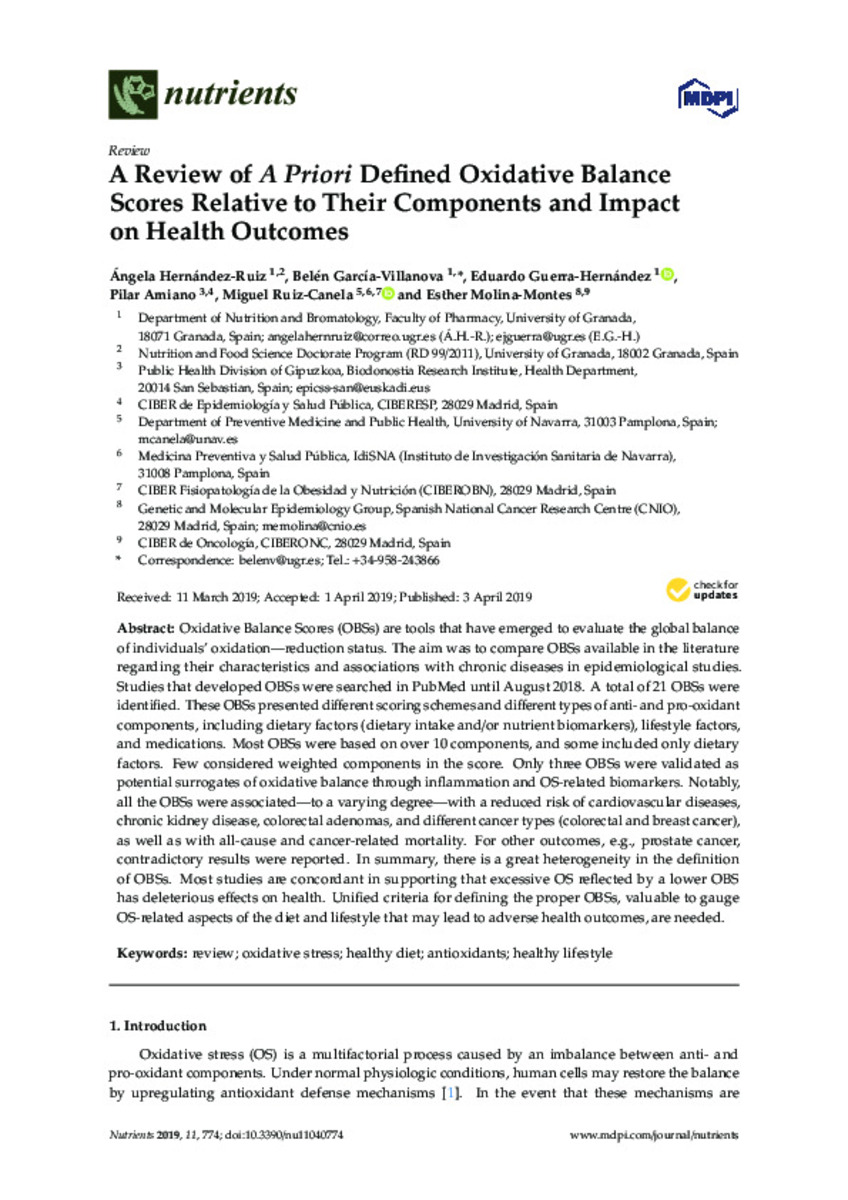Full metadata record
| DC Field | Value | Language |
|---|---|---|
| dc.creator | Hernández-Ruiz, Á, (Ángela) | - |
| dc.creator | García-Villanova, B. (Belén) | - |
| dc.creator | Hernández, E. (Eduardo) | - |
| dc.creator | Amiano, P. (Pilar) | - |
| dc.creator | Ruiz-Canela, M. (Miguel) | - |
| dc.creator | Molina-Montes, E. (Esther) | - |
| dc.date.accessioned | 2021-11-11T09:32:20Z | - |
| dc.date.available | 2021-11-11T09:32:20Z | - |
| dc.date.issued | 2019 | - |
| dc.identifier.citation | Hernández-Ruiz, Á, (Ángela); García-Villanova, B. (Belén); Guerra-Hernández, E. (Eduardo); et al. "A review of a priori defined oxidative balance scores relative to their components and impact on health outcomes". Nutrients. 11 (4), 2019, 774 | es_ES |
| dc.identifier.issn | 2072-6643 | - |
| dc.identifier.uri | https://hdl.handle.net/10171/62535 | - |
| dc.description.abstract | Oxidative Balance Scores (OBSs) are tools that have emerged to evaluate the global balance of individuals’ oxidation—reduction status. The aim was to compare OBSs available in the literature regarding their characteristics and associations with chronic diseases in epidemiological studies. Studies that developed OBSs were searched in PubMed until August 2018. A total of 21 OBSs were identified. These OBSs presented different scoring schemes and different types of anti- and pro-oxidant components, including dietary factors (dietary intake and/or nutrient biomarkers), lifestyle factors, and medications. Most OBSs were based on over 10 components, and some included only dietary factors. Few considered weighted components in the score. Only three OBSs were validated as potential surrogates of oxidative balance through inflammation and OS-related biomarkers. Notably, all the OBSs were associated—to a varying degree—with a reduced risk of cardiovascular diseases, chronic kidney disease, colorectal adenomas, and different cancer types (colorectal and breast cancer), as well as with all-cause and cancer-related mortality. For other outcomes, e.g., prostate cancer, contradictory results were reported. In summary, there is a great heterogeneity in the definition of OBSs. Most studies are concordant in supporting that excessive OS reflected by a lower OBS has deleterious effects on health. Unified criteria for defining the proper OBSs, valuable to gauge OS-related aspects of the diet and lifestyle that may lead to adverse health outcomes, are needed. | es_ES |
| dc.description.sponsorship | This research was co-funded by the Health Research Fund (FIS), Acción Estratégica en Salud (AES), of the Spanish Ministry of Economy and Competitiveness, grant number PI12/00002, and the European Regional Development Fund (ERDF). | es_ES |
| dc.language.iso | eng | es_ES |
| dc.publisher | MDPI AG | es_ES |
| dc.rights | info:eu-repo/semantics/openAccess | es_ES |
| dc.subject | Review | es_ES |
| dc.subject | Oxidative stress | es_ES |
| dc.subject | Healthy diet | es_ES |
| dc.subject | Antioxidants | es_ES |
| dc.subject | Healthy lifestyle | es_ES |
| dc.title | A review of a priori defined oxidative balance scores relative to their components and impact on health outcomes | es_ES |
| dc.type | info:eu-repo/semantics/article | es_ES |
| dc.description.note | © 2019 by the authors. Licensee MDPI, Basel, Switzerland. This article is an open access article distributed under the terms and conditions of the Creative Commons Attribution (CC BY) license (http://creativecommons.org/licenses/by/4.0/). | es_ES |
| dc.identifier.doi | 10.3390/nu11040774 | - |
| dadun.citation.number | 4 | es_ES |
| dadun.citation.publicationName | Nutrients | es_ES |
| dadun.citation.startingPage | 774 | es_ES |
| dadun.citation.volume | 11 | es_ES |
Files in This Item:
Statistics and impact
Items in Dadun are protected by copyright, with all rights reserved, unless otherwise indicated.






